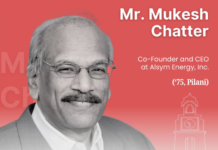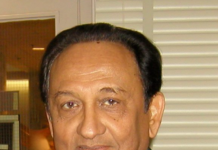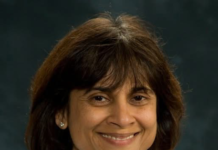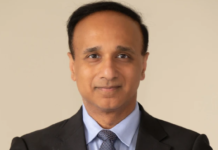BOSTON–In the latest episode of Chai With Manju, host Dr. Manju Sheth sits down with two distinguished voices in Indian classical music: Padma Bhushan Pandit Budhaditya Mukherjee, the legendary sitar maestro of the Imdadkhani Gharana, and Arnab Chakrabarty, a sarod virtuoso from the Shahjahanpur Gharana.
As the two maestros prepare to perform at the Shadaj’s 10-Year Celebration Concert in Boston, they share their rich personal journeys, artistic philosophies, and heartfelt reflections on music, legacy, and life.
To watch the full interview, please click here, or on the image below.
A Legacy in Strings: Pandit Budhaditya Mukherjee
Pandit Mukherjee (b. 1955) is a revered sitar maestro of the Imdadkhani Gharana, widely regarded as one of the greatest sitarists of the modern era. Trained exclusively by his father, Pandit Bimalendu Mukherjee, a doyen of the gharana, Budhaditya ji’s music combines lyrical gayaki-ang with dazzling technical virtuosity.
“I was very lucky to have my father as my guru,” he shares. “He played not only sitar, but also surbahar, esraj, and was a fine vocalist. Our home in Bilaspur was filled with music. Artists would visit, stay, perform—music was in the air.”
With over 2,800 concerts across 26 countries since 1979, his contribution to globalizing Indian classical music is unparalleled. He was the first musician to perform at the British House of Commons in 1990—an experience he recalls fondly.
“An elegant gentleman, a member of Parliament, came up to me after a concert and simply asked, ‘Would you like to play at the House of Commons?’ That’s how it happened. I later found out I was the first ever musician to perform there—of any genre.”
His accolades include the Padma Bhushan (2019), Sangeet Natak Akademi Award (2010), and Rashtriya Kalidas Samman (2022). Yet, his humility remains striking.
“My goal has never changed. Even today, it’s simply to be with the sitar. I still don’t dare say I ‘play’ the sitar. I am just with it.”
The Voice of the Sarod: Arnab Chakrabarty
Arnab Chakrabarty (b. 1980) is a distinguished sarod maestro celebrated for his emotive depth, raga imagination, and command over technique. Trained under stalwarts like Pandit Buddhadev Dasgupta, Dr. Kalyan Mukherjea, and Ustad Irfan Muhammad Khan, Arnab’s artistry merges tradition with subtle innovation. His musical roots are in the Shahjahanpur Gharana, enriched with vocal training from Pt. Yeshwantbua Joshi.
“My mother studied vocal music for 30 years and exposed me to great recordings and concerts. My father, a professor at IIT Bombay, helped foster a cultural environment at home and on campus,” he reflects.
He fondly recalls his first encounter with Pandit Budhaditya Mukherjee’s music: “I was six when I first heard him. He was playing at IIT Bombay. I still remember—he played Jor in Raga Kafi. That memory stayed with me.”
Now based in Toronto, Arnab has performed nearly 1,000 concerts in over 34 countries, while also nurturing the next generation of musicians. He received the Chalmers Arts Fellowship (2023) and multiple grants from the Canada Council for the Arts.
Throughout the conversation, both artists reflected on the spiritual and interpersonal dimensions of live performance.
“There is a silent communication between the artist and the audience,” said Pandit Mukherjee. “It’s not verbal, but it’s powerful. The music speaks to their souls, and their response energizes us.”
Arnab added: “It’s like riding in the same bus—you’re in control, but you’re also just a participant. The detachment is not from the audience, but from outcomes. Classical music is a process, not a performance for applause.”
Both shared thoughts on rituals before concerts. While Pandit ji offers a silent prayer—“Please hold me together”—Arnab focuses on self-encouragement: “I just tell myself to zoom out, stop agonizing, and have fun.”
As lifelong learners and teachers, both musicians had poignant insights on the evolution of guru-shishya parampara.
“Teaching is not just about ragas and techniques,” said Pandit Mukherjee. “It’s about transmitting thought and ambience. And that takes decades of association—not just lessons.”
Arnab added: “In today’s world of virtual learning, the challenge is transmitting subtlety. It requires patience—on both ends.”
Asked about their legacy, both responded with elegant simplicity.
“If someone remembers me as a sitar player they’d like to hear a second time,” said Pandit ji, “that is enough.”
Arnab echoed: “If someone wants to play my record again and smile, that’s all I want.”
As they prepare to perform at the upcoming Shaadaj’s10-Year Celebration Concert on October 25, both maestros had heartfelt messages for the Boston audience.
“I hope many come with open hearts,” said Pandit Mukherjee. “At a recent concert, someone said, ‘I never liked classical music before, but now I love it.’ That is the greatest reward.”
Arnab added: “Few but faithful—come in numbers and support Hindustani instrumental music. Especially with Pandit ji headlining, it’s going to be unforgettable.”














